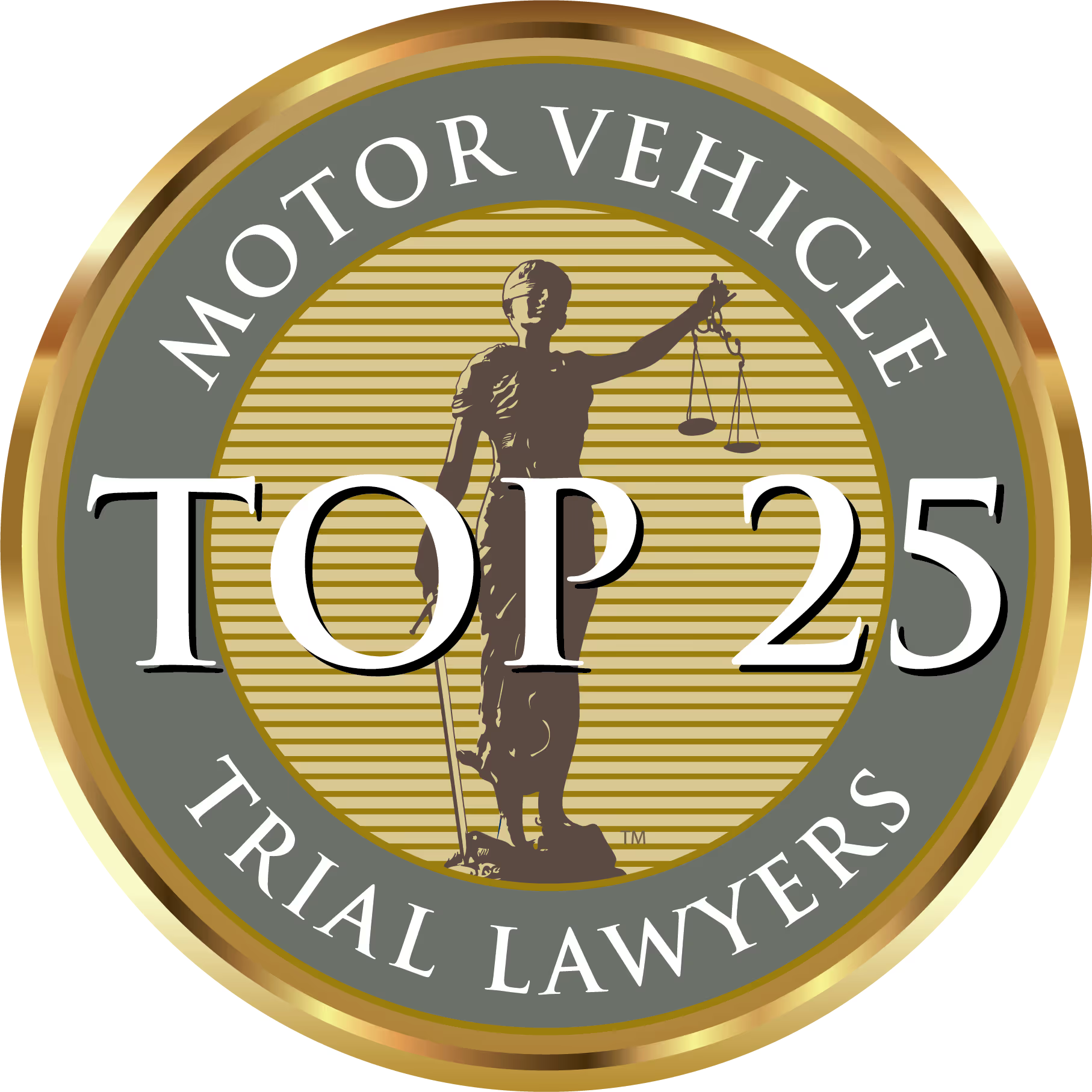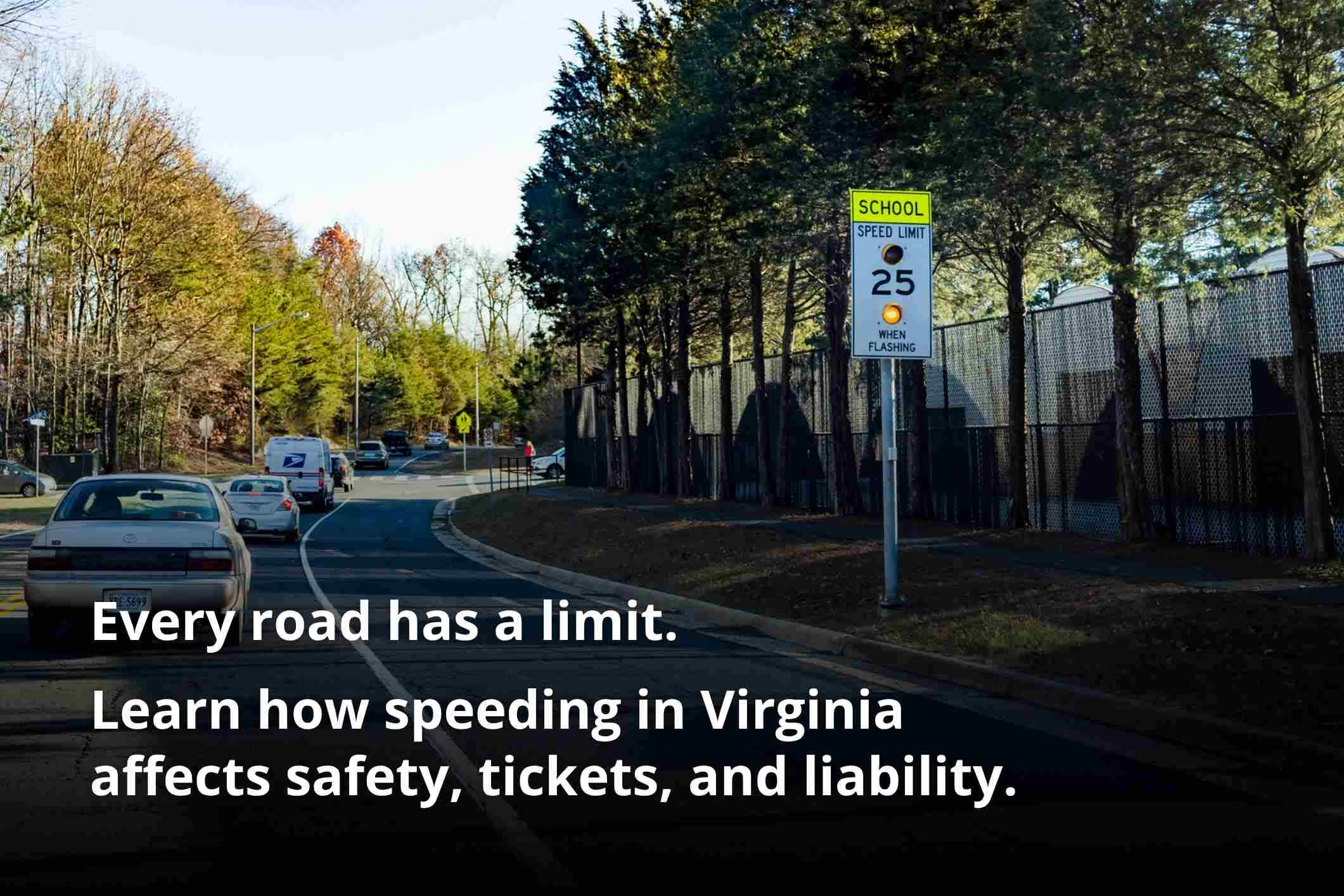Virginia Speed Limit Laws
Virginia Speed Limit Laws

.webp)

Every time you get behind the wheel in Virginia, your speed matters more than you might think. It affects how quickly you arrive, how much control you have, how fast you can respond, and how safe the road is for everyone around you.
Speed-related crashes are among the leading causes of injuries and fatalities across the state. Whether you're navigating a rural highway or driving through a quiet school zone, knowing and respecting Virginia speed limit laws is essential.
Ready to drive smarter and avoid serious trouble? Keep reading to get a full understanding of how speed laws in Virginia work and what happens when people ignore them.
Speed-related crashes can lead to injuries on highways, side streets, and school zones alike. Smith Law Center represents individuals hurt in collisions where another driver was going too fast. Call (757) 244-7000 or contact us online to learn more.
Take Action: Stay Informed, Drive Responsibly
If you're reading this, you're already taking an important step toward becoming a safer, more informed driver. Awareness of speed limits in VA isn't just about avoiding a fine. It's about creating safer roads for everyone. Share this article with new drivers or those unfamiliar with Virginia driving laws. It could prevent a tragic mistake.
Why Speed Limits Exist and What Happens When You Ignore Them
We've all seen the signs: 25 MPH, 55 MPH, 70 MPH. But those numbers carry more than just informational value. They are enforceable limits based on roadway design, traffic flow, pedestrian activity, and data from real-world crashes.
Not only does driving too fast lead to tickets, but it directly affects your stopping distance, maneuvering ability, and the severity of any crash that might occur. The faster you go, the greater the danger.
Virginia law defines both posted and default speed limits. When signs are missing, default rules still apply—and you're still accountable. Ignorance won't protect you from a ticket or worse.
What Are the Default Speed Limits in Virginia?
Virginia speed limit rules are based on road type. They are designed to balance efficiency with driver and pedestrian safety:
.avif)
Each road category introduces unique challenges. For example, high speeds make sense on a divided interstate with wide shoulders and long sightlines. But that same speed on a narrow, winding road or near a playground becomes dangerous.
School Zones, Business Districts, and Neighborhoods: Easy to Miss, Risky to Speed
Speed limits in Virginia neighborhoods and near schools are among the most overlooked yet most critical.
In residential areas and business districts, the default speed limit is 25 mph unless otherwise posted. These settings often include pedestrians, cyclists, driveways, intersections, and parked vehicles that block views. Drivers may assume they're in a low-risk area and accelerate, but that's when trouble happens.
School zones are regulated even more strictly. When lights flash, or signs are visible, limits often drop to 15 or 20 mph. These reduced limits typically apply during the pickup and drop-off windows, which usually span from early morning to late afternoon.
Violations in school zones carry heavier penalties. Courts and officers rarely show leniency, even if no children are present at that moment. Speeding through an active school zone may result in fines of up to $250 and increased insurance premiums.
Crashes involving speed typically come down to where they happened and how the road was used. Smith Law Center reviews location details and traffic behavior in injury cases involving excessive speed. Call (757) 244-7000 or contact us online for a no-cost case review.
Why Business Areas Are a Magnet for Speeding Tickets
From shopping centers to courthouse squares, many public areas fall under the same speed rules as neighborhoods—25 mph unless posted otherwise.
These areas are dense, visually cluttered, and full of unpredictable movement. Brick buildings, delivery vans, parked cars, and pedestrians all limit visibility and create more chances for a misjudged turn or quick stop.
Because incidents are common, the Virginia Department of Transportation (VDOT) and local governments track crash reports in business corridors. If a stretch of road sees too many violations or collisions, it may be targeted for changes. That might involve adjusting traffic signal timing, installing speed feedback signs, or even adding roundabouts. However, before those long-term fixes are implemented, law enforcement often increases patrols and ticketing.
The Fastest You Can Go in Virginia—And Where
The highest speed limit in Virginia is 70 mph, but that limit only applies on specific stretches of rural interstate. Roads like I-64, I-66, and I-81 meet the criteria for this upper limit, offering multiple lanes, wide shoulders, and limited intersections or merge points.
Even on those highways, conditions may require slower driving. You're expected to reduce speed in areas such as:
- Curves and ramps,
- Wet or icy pavement,
- Construction areas, and
- Traffic congestion.
A posted limit of 70 mph doesn't guarantee that speed is always safe or legal. Driving too fast for the conditions can still result in a citation or make you liable if a crash occurs.
When Speeding Becomes Reckless Driving
Most drivers associate speeding with a fine or warning. But in Virginia, speeding too fast crosses into criminal territory.
Under Virginia law, reckless driving by speed occurs when:
- A driver exceeds the posted limit by 20 mph or more, or
- A driver exceeds 85 mph on any road, regardless of the posted limit.
Unlike a simple ticket, reckless driving is a Class 1 misdemeanor. The consequences include:
- A fine of up to $2,500,
- Up to 12 months in jail,
- Six DMV points,
- License suspension, and
- A permanent criminal record.
These charges are often issued in high-speed zones or situations where police believe your actions endangered others, even if no crash occurred.
Speeding Penalties and DMV Points in Virginia
The Virginia speed limit laws are enforced through a point system that tracks how far drivers exceed posted or default limits. Your driving record, insurance rates, and even your ability to renew a license can be affected.
.avif)
Insurance companies often raise rates for violations, and the DMV may require driver improvement courses for repeat offenses. Multiple violations in a short time frame can also result in license suspension.
How Speed Impacts Crash Responsibility
Speed makes everything more dangerous. The faster you're going, the longer it takes to stop and the harder the impact will be. A vehicle moving at 40 mph can need more than 120 feet to stop under ideal conditions. Add rain, distraction, or poor brakes, and it gets much worse.
After a crash, investigators look closely at how fast each car was moving. That includes:
- Skid marks,
- Black box data from the vehicles,
- GPS logs,
- Surveillance or dashcam footage, and
- Witness accounts.
This evidence helps determine fault and is often used by insurance adjusters and injury attorneys to build a case when someone is injured.
How to Report Speeding in Your Neighborhood
If drivers regularly speed through your block, you can take steps to improve safety. Virginia communities are increasingly responsive to residential complaints.
Here's how to get started:
- Submit a complaint to your local Traffic Engineering or Public Works office.
- Request a radar survey or traffic study to document patterns.
- Organize a petition through your HOA or neighborhood group.
- Ask for temporary patrols during school hours, commutes, or weekend traffic.
In some cases, VDOT or city officials may lower speed limits or install speed bumps in areas where documented problems persist.
After a Speed-Related Crash: What to Do
If a speeding driver hit you, don't wait to act. Protect yourself by doing the following:
- Call 911 immediately, even if you feel okay;
- Get a complete medical evaluation;
- Ask the police to file a report;
- Photograph the damage, the road, and the surrounding area;
- Collect contact info from witnesses; and
- Reach out to a personal injury attorney familiar with speed-related claims.
Smith Law Center has handled hundreds of injury cases tied to excessive speed. Our team collaborates with investigators, engineers, and medical professionals to present solid evidence and advocate for fair compensation.
Injured by a Speeding Driver? You May Be Entitled to Compensation
Speeding plays a role in many crashes, but proving how fast someone was going isn't always simple. The attorneys at Smith Law Center represent people injured in collisions where speed was a factor, whether on highways, neighborhood streets, or near schools.
Call (757) 244-7000 or contact us online for a no-cost case review.
Proudly Representing Virginia Residents
About Smith Law Center












